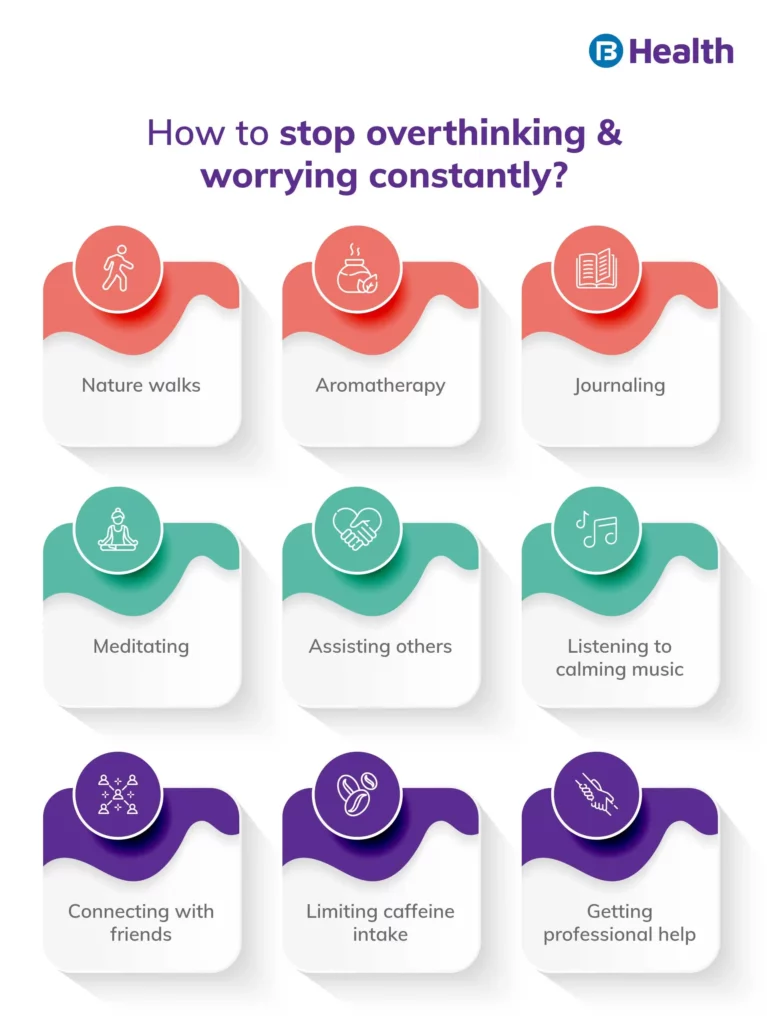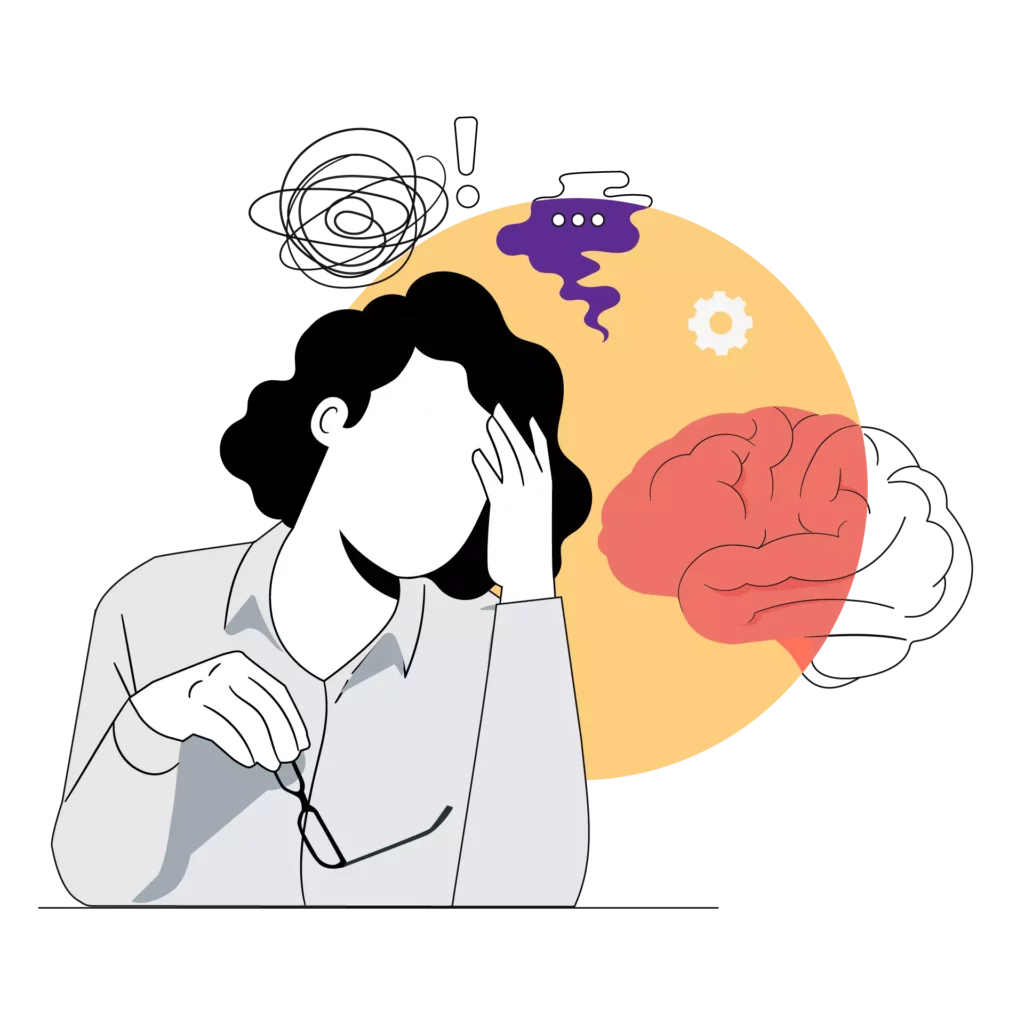Psychiatrist | 7 min read
How to Stop Overthinking: 15 Best Ways to Not Worry About Everything
Medically reviewed by
Table of Content
Synopsis
Overthinking can be a challenging habit to break and can affect your daily life. Some strategies can help you divert your thoughts. However, it's also important to be aware of your triggers and to seek support from loved ones or a mental health professional if needed. With time and effort, it's possible to overcome thinking and live a more balanced and peaceful life.
Key Takeaways
- Overthinking is constantly worrying, having negative thoughts, and self-doubt
- Practicing mindfulness and setting realistic goals can help stop overthinking
- Exercising, finding a hobby, or spending time with loved ones are great ways to redirect your thoughts into something
How to stop overthinking is a question many of us have asked ourselves at some point in our lives. Overthinking is what its name implies - thinking excessively. In and of itself, overthinking is not a recognized mental disorder. But according to research, it frequently co-occurs with other mental health issues like depression and anxiety disorders. [1] In this article, we’ll look at some of the best ways to stop overthinking.
What is Overthinking?
Overthinking is the habit of fixating on negative thoughts, events, or situations. Overthinking can be so bad that you may become obsessive, and breaking free of the cycle of bad thoughts is difficult. It can lead to anxiety, depression, and in some cases, even physical symptoms like headaches and insomnia. [2]
How to Stop Overthinking?
Here are 15 ways to stop overthinking:1. Getting outside in nature
The benefits of spending time in nature extend to both the body and the mind. It aids in easing stress, anxiety, and worry-related emotions. We are diverted from our problems and made to feel good by the natural world. Almost any type of physical activity can serve as a stress reliever. For example, stress hormone levels are reduced by regular exercise. Additionally, it aids in releasing endorphins, chemicals that elevate your mood and function as organic analgesics.
2. Using aromatherapy
Aromatherapy uses medicinal, aromatic essential oils to enhance physical, mental, and spiritual well-being. It improves mental and emotional health. Essential oils, diffusers, aromatic spritzers, inhalers, scented candles, bath salts, body oils, massage lotions, steamers, and other methods can all be used for aromatherapy. In addition, you can use some of the traditional scents, like lavender and rose.
3. How to stop overthinking by tuning in to calming music?
Calming music can reduce blood pressure, slow the heart rate and pulse, and lower stress hormone levels, distracting our worries. Try listening to music in the car or while performing other necessary tasks like taking a shower or getting ready for the day. You can also quickly fall asleep by listening to calming music before bed.
Additional Read: Mental Health Issues and Treatment
4. How to stop overthinking by journaling?
Keep a journal where you can record your thoughts. Any solutions that come to mind, you can write them down. It would be best if you wrote till you feel light and relaxed. Writing your thoughts and feeling from time to time will help you revisit them. This way, you can figure out the solutions to these problems.
5. How to stop overthinking with laughter?
Laughter relieves upsetting feelings. Endorphins, the body's natural feel-good hormones, are released while you are happy or laughing. It enables you to change your perspective and see things from a more practical, non-threatening angle. You can relax by watching amusing videos or any content that makes you feel better.
6. Connecting with your friends
Humans are social creatures who yearn for affection, understanding, and support. Remember that it is necessary to talk about your feelings for people to understand what you are going through. However, you must take the first step in their direction. You can also turn to your furry friends [4] if you feel too exposed to share your heart with others. With your loved ones, you don’t have to worry about overthinking.
7. Avoiding procrastination
You lose energy when you worry about something you need to do. To stay on top of your priorities and stop procrastinating, you can manage your stress differently. You may act impulsively due to procrastination, having to work hard to catch up. Establish the practice of creating a to-do list that is prioritized. Set reasonable deadlines for yourself and proceed through the list.
8. Through meditation and awareness
Being mindful involves being aware of daily life and the activities we frequently rush through. Returning to the body can lower the burden on your mind. For example, some people have discovered that colouring or doodling in a colouring book stimulates their creativity and provides a mental break.
9. How to stop overthinking by indulging yourself in the things you like?
Too much free time will encourage overthinking. If you want the answer to how to avoid overthinking, then try to indulge yourself in things that you like. You can do anything to distract your mind from worrying, including reading a book, listening to music, going for a walk, or taking a nap.
10. How to stop overthinking with yoga?
Yoga has gained popularity as a form of exercise and stress reduction for people of all ages. Yoga modifies stress response and lowers cortisol levels, blood pressure, and heart rate. To relax your body, concentrate on your breathing. While focusing, you can find your center by controlling your breathing. You can try pranayama, tree pose, extended puppy pose etc., for anxiety.
11. How to stop overthinking by giving yourself a decision deadline and a break?
Set a deadline for deciding when you need to solve a problem. Consider taking small breaks to divert yourself when or if the decision-making process becomes overwhelming.
12. By learning to embrace the past and let it go
Taking care of yourself is important. You don't have to punish yourself excessively by placing the blame on circumstances that are beyond your control. Ask yourself if your thoughts can be directed more constructively towards coming to a decision or a solution. When something from the past bothers you, convince yourself that it is just in your head and you can let it go.
13. By limiting your caffeine intake
Caffeine may increase anxiety and panic attacks in people with panic disorders and may even worsen premenstrual syndrome symptoms. Excessive caffeine may cause restlessness, irritability, nervousness, insomnia, diuresis, tremors, and tachycardia at relatively low doses. [3]
14. How to stop overthinking by assisting others?
We can expand our perspective by helping others. It can also aid in helping us change our focus from our problems to something else. According to studies, helping others lowers people's levels of anxiety and depression.
15. Getting professional treatment
Overthinking can be avoided with self-training and commitment. If you find it difficult to stop overthinking, seek professional assistance. You might learn techniques from a mental health professional that will enable you to stop doing things that aren't beneficial. They might also assist you in identifying coping mechanisms that suit you, like mindfulness or exercise.

Signs Of Overthinker
You think a lot after indulging in any activity
One of the main signs you are overthinking is that you think a lot after you speak. You ponder over your mistakes or feel guilty far too much. Also, the inability to accept what has occurred increases over a period of time.
You tend to worry and assume the worst
One of the typical symptoms of overthinking is that you assume the worst. You begin to consider future aspects, such as your education or relationships, and worry about what would happen in the worst-case scenario. for example. If you apply for a course, you always assume that you will not get it, or in the case of exams, you assume that you will perform poorly.
You're sleep deprived
Another tell-tale sign of overthinking is when it starts right before bedtime. The peak time for overthinking is midnight, which can last until 4 or 5 pm. After that, your worry won't go away.
You are indecisive
You frequently second-guess your choices or repeatedly replay your errors in your mind. This further impairs your judgment, making it impossible to decide for yourself. Even if you make a decision, you won't follow through because you fear failure or the possibility of hurting yourself.
You focus on issues you can't change or control
You frequently dwell too much on the past or the future, worrying about things beyond your control. But, unfortunately, you also consider things beyond your control or unimportant issues that will have a small impact on you.
You constantly feel bad
Self-doubt is another cause of overthinking. Some people constantly second-guess themselves and reflect on their choices and deeds. And even though it wasn't your fault, you keep apologizing. For example, when you find yourself in a heated quarrel or argument, you begin to feel responsible for the other person's injuries and begin to apologise, even though you are the one being accused and wronged.
Additional Read: Somatic Symptom DisordersOverthinkers will take an abnormally long time to make a decision. In the end, they frequently reflect on their choices and regret them. This makes their situation even worse. Therefore, it is always advised to look after yourself as much as possible. It can be difficult and overwhelming to get rid of overthinking, but you can always reach out to a medical professional by making an online appointment with Bajaj Finserv Health.
References
- https://www.who.int/news-room/fact-sheets/detail/mental-disorders
- https://www.health.harvard.edu/mind-and-mood/pain-anxiety-and-depression
- https://www.ncbi.nlm.nih.gov/pmc/articles/PMC8467199/
- https://www.ncbi.nlm.nih.gov/pmc/articles/PMC8584515/
Disclaimer
Please note that this article is solely meant for informational purposes and Bajaj Finserv Health Limited (“BFHL”) does not shoulder any responsibility of the views/advice/information expressed/given by the writer/reviewer/originator. This article should not be considered as a substitute for any medical advice, diagnosis or treatment. Always consult with your trusted physician/qualified healthcare professional to evaluate your medical condition. The above article has been reviewed by a qualified doctor and BFHL is not responsible for any damages for any information or services provided by any third party.





